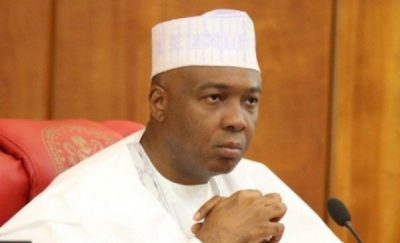Lawmakers pass PIGB with five per cent fuel levy
Nigerians will have to pay more for fuel as the National Assembly yesterday passed the Petroleum Industry Governance Bill (PIGB) with five percent levy on fuel sold across the country.
According to the lawmakers, the five percent levy will be used to fund the Petroleum Equalisation Fund (PEF) as reflected in the new bill.
The passage followed the consideration and adoption of the conference committee report on the bill.
Going by Section 36 (1) (a) of the bill, “There shall be established the Petroleum Equalisation Fund into which shall be paid all monies payable to the Equalisation Fund by way of a 5 percent fuel levy in respect of all fuel sold and distributed within the Federation which shall be charged subject to the approval of the Minister (of Petroleum)”.
Other sources of financing the PEF, as stated in the bill, include subventions, fees and charges for services rendered, as well as net surplus revenue recovered from petroleum products marketing companies.
The Bill empowered the Equalisation Fund to collect all revenues and levies charged; determine the net surplus revenue recoverable from any oil marketing company and accruing to that company from the sale by it of petroleum products at such uniform prices as may be fixed by the Minister; determine the amount of reimbursement due to any oil marketing company for purposes of equalisation of price of products among others.
It also seeks to provide for the governance and institutional framework for the petroleum industry.
One of the major highlights of the bill is one seeking to unbundle the Nigerian National Petroleum Corporation (NNPC), provide for the establishment of Federal Ministry of Petroleum Incorporated, Nigerian Petroleum Regulatory Commission, Nigerian Petroleum Assets Management Company and National Petroleum Company and Petroleum Equalisation Fund.
The regulatory bill also seeks to replace the NNPC with the National Petroleum Commission.
If it eventually becomes law, existing agencies, like the Petroleum Inspectorate, Department of Petroleum Resources (DPR) and the Petroleum Products Pricing Regulatory Agency (PPPRA) will be abolished.
Their functions will then be transferred to a new agency -the Nigeria Petroleum Regulatory Commission (NPREC) as provided in the new bill.
The bill empowers the NPREC ‘to administer and enforce policies, laws and regulations relating to all aspects of petroleum operations.
It also empowers it to monitor and enforce compliance with the terms and conditions of all leases, licences, permits and authorisations issued in respect of any petroleum operations.
It will also define and enforce approved standards for design, construction, fabrication, operation and maintenance for all plants, installations and facilities utilized or to be utilised in petroleum operations.
Similarly, it is empowered to establish, monitor, regulate and enforce health and safety measures relating to all aspects of petroleum operations; establish the framework for the validation and certification of national hydrocarbon reserves; advise the Minister on fiscal and other issues pertaining to the petroleum industry; undertake evaluation of national reserves and reservoir management studies.
It also empowers the body to issue licences, permits or authorisations for downstream gas, petroleum products, storage depots, retail outlets, transportation and distribution facilities for the industry.
President of the Senate Bukola Saraki urged President Muhammadu Buhari to sign the bill into law.
Saraki said, “I hope with this, we will get the assent of Mr President and hopefully open a new page for the petroleum industry”.
At the House of Representatives, there was a concurrence as the report of the conference committee on “A bill for an act to provide for the Governance and Institutional Framework for the Petroleum Industry (PIGB)” was considered and adopted.
The next step is the transmission of the bill to the President for assent and if signed into law, the NNPC will be unbundled into smaller independent companies.
Also, the House moved closer to its resolve on the stoppage of the sales or concession of the Ajaokuta Steel Company.
At the Committee of the Whole House, chaired by Speaker Yakubu Dogara, the House considered and adopted the report of a bill to provide for the withdrawal of $1b from the Excess Crude Account (ECA) for the completion of the 98 per cent completed steel company.
The bill was sponsored by 301 members of the House.
If signed into law by the President, after scaling the Senate huddle for concurrence, the Presidency will be empowered to withdraw $1b from the ECA to complete the project. (The Nation )


